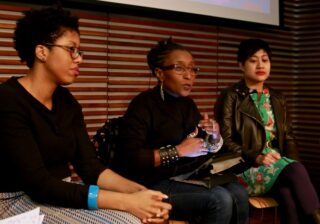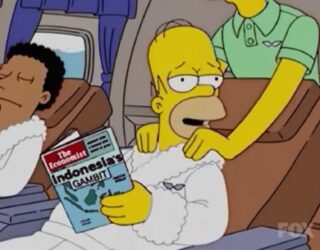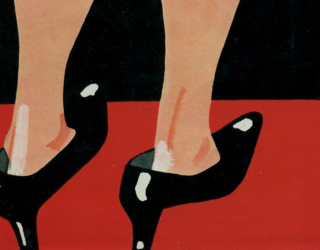Taking place over two days, 22nd and 23rd April at Toynbee Studios in East London with a launch party on the 21st at St Ethelburga’s Centre for Peace and Reconciliation, Bare Lit brings internationally established and emerging writers based across the UK together to share works of fiction, non-fiction, poetry, playwriting and journalism.
Panel discussions explore a multitude of topics, from how writing by women is often marketed as writing for women to a new wave of radical, activist and community print publications to sex and erotica. They touch on the past by questioning how writers present and preserve histories of culture, food, music and community and look to novel mediums, from performance poetry to play- and screenwriting and there’s much more on offer.
Bare Lit was founded last year by people involved in Media Diversified (MD), a non-profit organization publishing analysis, stories and cultural content by writers in diaspora. The festival’s founding team include MD founder and filmmaker Samantha Asumadu, CEO of MD Henna Zamurd-Butt and Mend Mariwany who now works with Skin Deep Magazine. The inaugural festival was also supported by writers Courttia Newland and Sunny Singh noting they were “rarely invited to literary festivals”.
Bare Lit’s second festival comes amid a swathe of publications working to raise the profile of talented writers of colour and address the ongoing lack of representation across both literary and media platforms more broadly. The award-winning platform for women of color gal-dem released a print magazine last year. Nikesh Shukla’s edited collection The Good Immigrant brought together 21 writers to “explore what it means to be black, Asian and minority ethnic in Britain today”. Sabrina Mahfouz edited collection The Things I Would Tell You brings together literary heavyweights to emerging spoken word artists to “blow away the narrow image of the ‘Muslim Woman’”. The first annual Jhalak Prize, co-founded by Nikesh Shukla, Sunny Singh and Media Diversified addresses the lack of recognition for talented writers of color. These are just a few.
Ahead of the festival, we caught up with Directors Henna Zamurd-Butt and Mend Mariwany, as well as hearing from a range of panelists involved in the weekend.
Bare Lit seeks to not only challenge issues of inclusion and representation, but also what kind of representation that is, what writers of color can or are able to discuss at literary festivals.
Zamurd-Butt – “Our friends, many of whom were successful published writers talked about how they didn’t get invited to literature festivals – and when they did it was as the token person of colour. So they ended up having to talk about race, identity and diversity rather than their own work and interests. Bare Lit was born to change that.
Our ethos is one of celebration of artistic excellence – as such it isn’t a place where we talk about diversity or inclusion. Instead we choose to focus on the writing, the mediums, the genres and themes. If the festival wasn’t organized by people who share common experiences with the speakers – those of living in diaspora and racialization – then we wouldn’t be able to do this.”
Both Zamurd-Butt and Mariwany made it clear the community of writers and creators surrounding Bare Lit was vital. Mariwany emphasized that as they draw their panelists from around them, from the networks they are familiar with, it’s important to care for this community, nurturing it and respecting the long-term survival. It’s a deeper relationship than one of ticking boxes. Panelists are brought together not just to create fantastic discussions but also to build the kind of spaces that can strengthen their work, through audience questioning but also feeding back to each other.
Mariwany – “We are constantly being inspired by and looking for inspiration from the communities of writers of colour that we are embedded within. Really, and I said this the first year too, I also kind of wanted to make Bare Lit just for me. It’s important to be able to have a community of writers come together, share their stories, inspire each other, find each other but also meet publishers, readers and collaborate.
It’s important as well for children or younger people who are just starting or maybe haven’t even thought about being a writer to see panels made up of people of color to show that you don’t have to be white, middle class and from a lineage of writers. Hopefully it gives some inspiration.”
Around questions of inclusion and representation, the numbers are stark. In 2015, the UK’s three largest literary festivals featured over 2000 authors. Of those 2000+ authors, only four per cent were from Black Caribbean, Black African, South Asian or East Asian backgrounds, based on a report published by Spread The Word.
Bare Lit provides an inclusivity not just because of who the writers are, but for what they do, giving space for them to breathe and discuss numerous issues surrounding their work, becoming a writer, working with editors, their writing process and more.
Mariwany – “Of those four per cent, many of those writers will be asked to talk about diversity and find it difficult to talk about their own work. We really wanted to make sure not to do that. Although during the first year it was a bit like the elephant in the room and we did have those conversations but we made sure not to get stuck there, to be able to talk about peoples’ craft, works and influences, things they wanted to talk about.”
This was mirrored by Olumide Popoola (When We Speak Of Nothing, July 3rd):
“Bare Lit festival addresses the lack of adequate representation of BAME writers at literary festivals, not just in relation to numbers but also in terms of what topics one gets to speak about. I value it as a wonderful space to be in conversation with other writers, publishers and editors, to discuss topics of craft, content and creative process.”
This year also sees the release of the Bare Lit ’16 Anthology, featuring original, previously unpublished short stories and poetry from participants of the inaugural festival. One of the curators of the anthology, Kavita Bhanot, editor of the short story collection Too Asian, Not Asian Enough said: “This anthology is about creating a space for writers of color to shine on their own terms.”
To many commenters, Bare Lit offers both a simultaneous challenge to the failures of mainstream literary festivals to accommodate the talent of writers of color but at the same time represents an assertiveness about the value of their work and their contributions to the understanding of what we define as ‘literature’.
Yasmin Gunaratnam, author, Sociology lecturer and curator of Media Diversified’s academic space noted:
“For me the significance of Bare Lit is two-fold. Most obviously, it’s a breath of fresh air as a literary festival. Festivals have such a poor record of representing the work of writers of color, and they are not great at highlighting working class voices either. But more importantly for me, the festival, and at this post-Brexit moment, offers an alternative to parochialism. It provides glimpses into different worlds and expands our horizons. And of course, it’s about great writing.”
The expansion of these horizons comes from numerous initiatives not just in the past few years but stretching further back, that have sought to push against and re-imagine the nature of the UK’s literary landscape.
As author and academic Leone Ross (Come Let Us Sing Anyway, June 5th) emphasized:
“Black people have always had to create their own vibrant literary spaces in this country. In the 60s, New Beacon Books blazed a trail for black publishing in the UK, along with Bogle L’Ouverture and Karnak House. In the 80s it was the International Book Fair of Radical and Third World Books – still going strong today, by the way! In the 90s, Tony Fairweather packed out venues with everyone from Iyanla Vanzant to Terri McMillan. Bare Lit follows in the steps of that tremendously important BAME tradition – organizing and loving our own art because we couldn’t wait on the mainstream to publish or promote us or to create spaces for our discourse and our growth.”
Zhamurd-Butt – “We feel that we are part of a burgeoning and self-supporting ecosystem of creatives that includes the Jhalak Prize, BAME in Publishing, Media Diversified, and many more initiatives where groups and individuals are no longer seeking to appease the mainstream.”
Poet and essayist Momtaza Mehri said:
“Creating these spaces is vital in terms of being in community with writers who share your perspectives and priorities, whilst acknowledging and celebrating the differences between us as writers from racialized communities. To share work with both peers and audiences who may be alienated from the literary festival circuit is necessary and is the only way the cultural needle moves forward. We need these interventions as writers/readers/editors if we’re ever to even begin to address the gaps in wider imagination (or even our own).”
Frances Mensah Williams (From Pasta to Pigfoot and From Pasta to Pigfoot: Second Helpings) highlighted:
“Sometimes people ask, ‘Why do we need a literary festival that only celebrates writers from ethnic minorities?’ and I’m reminded of questions like ‘Why is there a need for Ebony magazine – can you imagine calling a magazine Ivory and getting away with it? Isn’t that racist?’ Bare Lit is seeking to address the poor showing of non-white writers among the largest literary festivals, giving a voice to writers from diverse backgrounds. I’m honored to have been invited to participate in the 2017 festival and to share my thoughts with writers who must not only craft a great story but navigate other unseen barriers. I’m really excited about attending Bare Lit because once you get past all the superficial skin color stuff, the rest is just fascinating people with diverse viewpoints of the world who can tell a cracking tale.”
Gautam Malkani (Londonstani and The Story Distorted) praised the originality of the festival:
“The thing that’s most striking is just how fascinating and original the program of events sounds. Because, let’s face it, there’s nothing diverse about the usual pigeonholing writers of color onto panels about race and diversity. The success of the festival speaks to the pent up demand for it. When the mainstream publishing industry says there isn’t a market for these kinds of books or for these writers, they’re basically saying they can’t be bothered to develop a market for it. But their laziness disguised as risk aversion ignores one basic business principle that applies to all industries, whether it’s books, literary events or breakfast cereals, which is that markets are grown at the margins. And this is what Bare Lit has demonstrated.”
Science writer Angela Saini (Inferior: How Science Got Women Wrong and the New Research That’s Rewriting the Story)
“It’s important to have festivals like Bare Lit to showcase the work and ideas of writers of color because mainstream media often overlooks all but the big names. We have a voice and important things to say, from a fresh perspective. In my field, science journalism, I’m pleased to say that there are lots of people from diverse backgrounds. But even we can do better to highlight the issues inside science that perpetuate sexual and racial stereotypes. I’m proud to be speaking on Sunday about themes such as these from my new book, Inferior.”
While the fight to diversify media and literature spaces is ongoing, initiatives like Bare Lit are almost fast-tracking that process. Instead of waiting around or ‘begging’ for inclusion, they are building what a literature landscape that valued and was respectful to a diversity of voices would look like, not just for their own sake but because there is value in their stories, experiences and lessons.
The voices, histories and experiences of BAME writers are not to be seen as a separate entity requiring access to the dominant structures, but rather as already fundamentally intertwined.
As Nikesh Shukla’s edited volume The Good Immigrant makes apparent, these histories and experiences are ‘British’ experiences, they are the experiences of people who have had to negotiate the effects and impacts of the structures that many writers and activists seek to struggle against and their testimonies and voices should be given the respect deserved by those who wish to better understand.
Within many of these initiatives and publications you find the truths that are sometimes hidden, sometimes visible about the story that Britain tells itself. They expose its underside – the lack of acceptance, the struggle to belong, to exist as oneself, to be devalued, talked over, disrespected, paid less, to have work and ideas stolen, to have labor unrecognized and undercompensated.
If literature is a medium through which to understand human experiences, to make sense of the world, a vehicle of political expression, then we must acknowledge the debasing effect of a lack of inclusivity.
Image: Wasi Daniju



